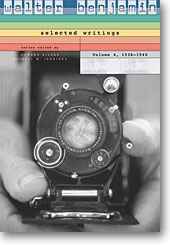Selected Writings 1938-1940

Editorial Harvard University Press
Fecha de edición octubre 2006
Idioma inglés
EAN 9780674022294
496 páginas
Encuadernación en tapa blanda
Resumen del libro
"Every line we succeed in publishing today...is a victory wrested from the powers of darkness." So wrote Walter Benjamin in January 1940. Not long afterward, he himself would fall prey to those powers, a victim of suicide following a failed attempt to flee the Nazis. However insistently the idea of catastrophe hangs over Benjamin's writings in the final years of his life, the "victories wrested" in this period nonetheless constitute some of the most remarkable twentieth-century analyses of the emergence of modern society. The essays on Charles Baudelaire are the distillation of a lifetime of thinking about the nature of modernity. They record the crisis of meaning experienced by a civilization sliding into the abyss, even as they testify to Benjamin's own faith in the written word.
This volume ranges from studies of Baudelaire, Brecht, and the historian Carl Jochmann to appraisals of photography, film, and poetry. At their core is the question of how art can survive and thrive in a tumultuous time. Here we see Benjamin laying out an ethic for the critic and artist--a subdued but resilient heroism. At the same time, he was setting forth a sociohistorical account of how art adapts in an age of violence and repression.
Working at the height of his powers to the very end, Benjamin refined his theory of the mass media that culminated in the final version of his essay "The Work of Art in the Age of Its Technological Reproducibility." Also included in this volume is his influential piece "On the Concept of History," completed just before his death. The book is remarkable for its inquiry into the nature of "the modern" (especially as revealed in Baudelaire), for its ideas about the transmogrification of art and the radical discontinuities of history, and for its examples of humane life and thought in the midst of barbarism. The entire collection is eloquent testimony to the indomitable spirit of humanity under siege.
Biografía del autor
Nació en Berlín en 1892, en el seno de una próspera familia judía. Estudió filosofía y se licenció en Berna en 1918 con una tesis sobre el concepto de crítica del arte en el Romanticismo alemán. Trabajo singular con el que sin embargo no consiguió integrarse en la institución académica, aunque su nombre se asocia indefectiblemente con la formación temprana de la Escuela de Frankfurt. Influido por la mística judía y el marxismo, dejó una obra polifacética en la que se combina la filosofía, la sociología y la crítica literaria, y cuya influencia ha ido creciendo exponencialmente desde su muerte. Se quitó la vida en Portbou, al creer que las autoridades lo devolverían a los nazis, de los que huía, de una manera o de otra, desde 1933.








